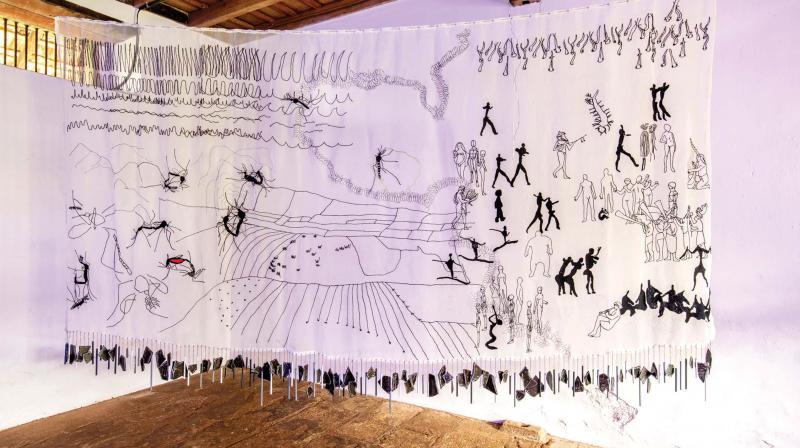How mosquitoes shaped colonial history? Caccuri has answer
Brazilian artist's multi-media installation at Kozhi-Muziris Biennale narrates mosquito-man relationship.

Kochi: If a survey is conducted in Kochi on the most common feature of the wannabe metro city, most denizens would choose mosquito. And no wonder why they make it to Kochi-Muziris Biennale, the signature art event of the city, albeit via Brazil.
Vivian Caccuri, the artist from another tropical zone in her native Brazil, could easily relate to the buzz and bite of that insect common to both countries. At the Biennale, the 32-year-old artist has a multi-media installation on display, narrating more about the relationship mosquitoes share with humanity.
Caccuri's work at sea-facing Pepper House in Fort Kochi features a mosquito net, chimes, ultra-violet light and speakers that play the sound of mosquitoes mating.
Using sound as a way to cross-experiment, the 'Mosquito Shrine' examines the insect's sense of perception, notes certain historical points essentially related with its disease-spreading capacity and takes a look at the role it plays in social conditioning. The work also triggers a vital question: why does the mosquito noise cause so much duress in humans?
The Rio de Janeiro-based artist got the idea earlier this decade when she was in Ghana. The West African country was facing yet another bout of malaria, and Caccuri noticed herself getting increasingly conscious about mosquitoes despite her familiarity with the insect from childhood. “I think the fear has a colonial origin,” she says. “For, as mosquito bite has been not that dangerous for the people of the global south as it has been with their European oppressors. I believe the insect, thereby, decelerated the process of colonisation.”
At the biennale, she uses multiple elements for this particular installation, including a tower of speakers that emits a composition based on the insect’s mating noise. There is a sculpture made of netting, besides ‘Pagode’ screens on which the artist has embroidered scientific and mythical passages about the mosquito. Also, UV lamps bring mosquitoes to the space. The sound, she says, has been tuned with the goal of attracting male mosquitoes.
Caccuri, who was a 2018 finalist at the PIPA (Photobox Instagram Photography Awards), believes that the dislike towards these insects could have possibly had a deeper subconscious meaning. “What if we are remembering something from a different past or different world? More on the line of psychoanalysis where the fear of the disease is stronger?" says the artist.

